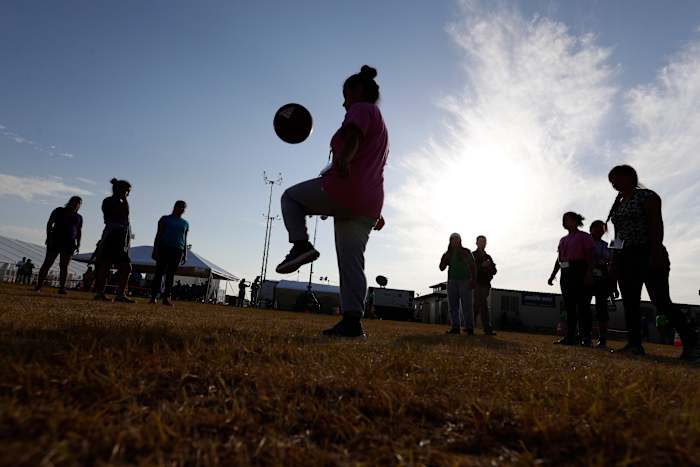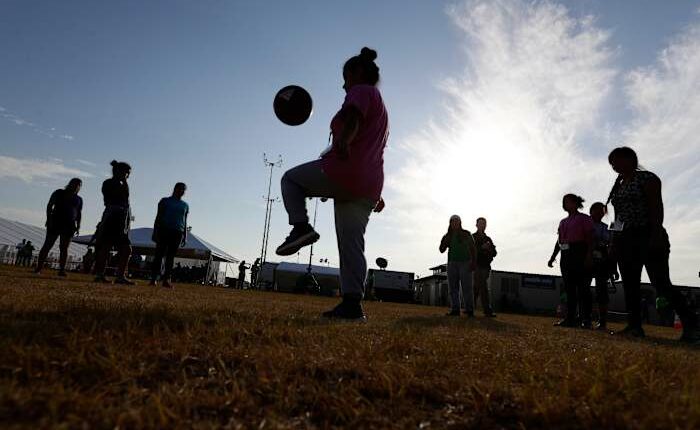Share this @internewscast.com

MCALLEN, Texas – A federal judge has rejected the Trump administration’s attempt to end a long-standing policy designed to protect immigrant children under federal care, which has been in effect for nearly 30 years.
U.S. District Judge Dolly Gee in Los Angeles delivered her decision a week following a hearing with representatives from the federal government and attorneys advocating for the immigrant children in detention.
Gee described the recent hearing as “déjà vu,” referencing the federal government’s previous efforts in 2019 to terminate the Flores Settlement Agreement during the initial Trump administration. She echoed this sentiment in her decision on Friday.
“There is nothing novel regarding the facts or legal principles at play. The Court could, therefore, dismiss the Defendants’ motion on these grounds alone,” Gee stated, addressing the government’s reference to a law they argued restricted the court from enforcing the agreement.
In this latest effort, the government claimed they had implemented significant changes since the agreement’s establishment in 1997, establishing standards and practices that align with related legislation and the agreement itself.
Gee recognized that while the government had made strides in improving detention conditions, she remarked, “These advancements clearly demonstrate that the FSA is achieving its goal, yet to argue for its dissolution merely because of some progress is illogical.”
Attorneys representing the federal government told the court the agreement gets in the way of their efforts to expand detention space for families, even though Trump’s tax and spending bill provided billions to build new immigration facilities.
Tiberius Davis, one of the government attorneys, said the bill gives the government authority to hold families in detention indefinitely. “But currently under the Flores Settlement Agreement, that’s essentially void,” he said last week.
The Flores agreement, named for a teenage plaintiff, was the result of over a decade of litigation between attorneys representing the rights of migrant children and the U.S. government over widespread allegations of mistreatment in the 1980s.
The agreement set standards for how licensed shelters must provide food, water, adult supervision, emergency medical services, toilets, sinks, temperature control and ventilation. It also limited how long U.S. Customs and Border Protection could detain child immigrants to 72 hours. The U.S. Department of Health and Human Services then takes custody of the children.
The Biden administration successfully pushed to partially end the agreement last year. Gee ruled that special court supervision may end when HHS takes custody, but she carved out exceptions for certain types of facilities for children with more acute needs.
In arguing against the Trump administration’s effort to completely end the agreement, advocates said the government was holding children beyond the time limits. In May, CBP held 46 children for over a week, including six children held for over two weeks and four children held 19 days, according to data revealed in a court filing. In March and April, CPB reported that it had 213 children in custody for more than 72 hours. That included 14 children, including toddlers, who were held for over 20 days in April.
The federal government is looking to expand its immigration detention space, including by building more centers like one in Florida dubbed “ Alligator Alcatraz,” where a lawsuit alleges detainees’ constitutional rights are being violated.
Gee still has not ruled on the request by legal advocates for the immigrant children to expand independent monitoring of the treatment of children held in U.S. Customs and Border Protection facilities. Currently, the agreement allows for third-party inspections at facilities in the El Paso and Rio Grande Valley regions, but plaintiffs submitted evidence showing long detention times at border facilities that violate the agreement’s terms.
Copyright 2025 The Associated Press. All rights reserved. This material may not be published, broadcast, rewritten or redistributed without permission.














